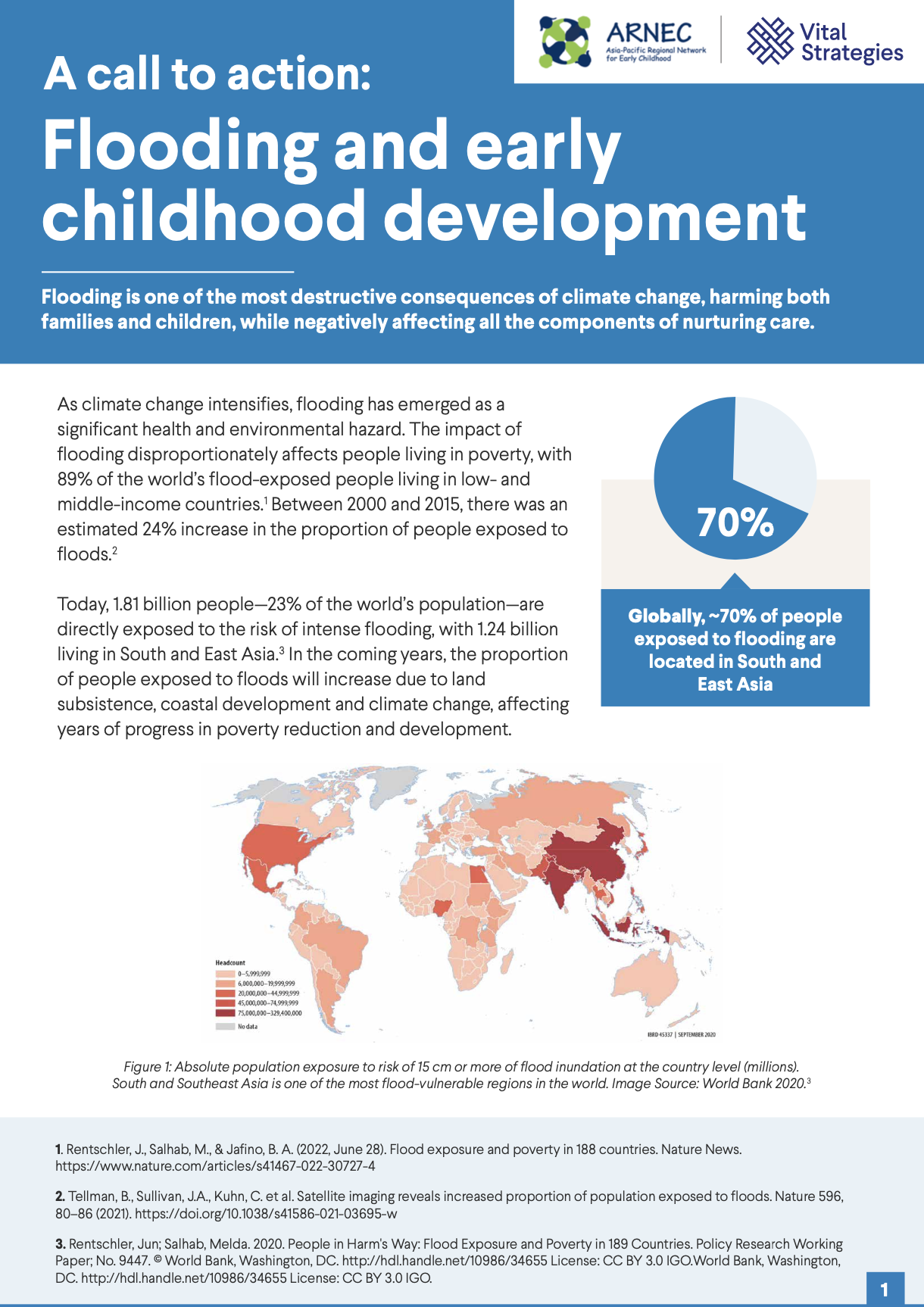Did you know that over 400 million children in the Asia-Pacific region live in areas with extremely high flood risk, and 70% of people exposed to flooding globally are in South and East Asia?
A new advocacy brief jointly developed by Vital Strategies and ARNEC (Asia-Pacific Regional Network for Early Childhood Development) showcases in detail the impacts of flooding on early childhood development, and strategies to minimise these impacts. Flooding was identified as a top environmental concern among early childhood advocates in the Asia-Pacific region in a previous ARNEC scoping study conducted in 2022, underscoring the fact that flooding is one of the most destructive consequences of climate change.
Young children, with their unique physiological, psychological and social needs, are particularly vulnerable during and after floods. Besides the direct risk of drowning and injury from debris, floods also increase the incidence of illnesses such as skin and respiratory infections, diarrhoea, cholera and hepatitis A.
Floods also impact the five components essential for a healthy childhood – health, safety, education, nutrition and responsive caregiving. For example:
- Impacts on Good Health: Besides the direct risk of drowning and injury from debris, floods also increase the incidence of illnesses such as skin and respiratory infections, diarrhoea, cholera, and hepatitis A
- Lack of Adequate Nutrition: Floods affect supply chains and lead to food shortages
- Compromised Safety and Security: Studies show an increase in child abuse, exploitation and trafficking during and after the chaotic time of flood events
- Decline in Responsive Caregiving: The loss of homes and livelihoods cause immense stress to parents, reducing their ability to provide responsive care
- Reduced Opportunities for Early learning: The damage and closure of schools and play areas result in poorer educational and mental health outcomes.
The brief also offers key recommendations including:
- Understand the risks of flooding where you live and be aware that risks can evolve with urban development and climate change.
- If you live in a flood-prone area, prepare yourself on what you should do in the event of a flood, prioritising the safety of vulnerable family members like children and elderly. The advocacy brief provides more detail on how you can do this, but you can also get in touch with your local authorities to learn more.
- Advocate for child-centered measures for flood preparation, response and mitigation in your community or city. These include the strengthening of health systems, child protection systems and the continuity of education for children.
To learn more about these impacts and what we can all do to better prepare for floods, please download the advocacy brief.
To read the previous brief on Air pollution, click here.
Recent Abstracts
How the Alcohol Industry Steers Governments Away From Effective Strategies to Curb Drink…
Analysis of the Efficacy of Alcohol Industry-Sponsored Drink-Driving Campaigns
Messaging Recommendations for Effective Road Safety Campaigns: Lessons From Formative Research for Drink…
Testimonials: Personal stories that have the power to save lives on the road
Knowledge, Attitudes, and Practice Study on Lead Poisoning and Pollution in Indonesia
Improving Civil Registration and Vital Statistics Systems in French-Speaking Countries: Opportunities and Challenges
Strengthening the Civil Registration and Vital Statistics (CRVS) System in Colombia
Estimation of the direct and indirect costs attributable to alcohol consumption in Brazil
Guidance for Collection and Processing of Cause-of-Death Data in the Civil Registration and…
Vital Strategies: Reimagine Public Health
